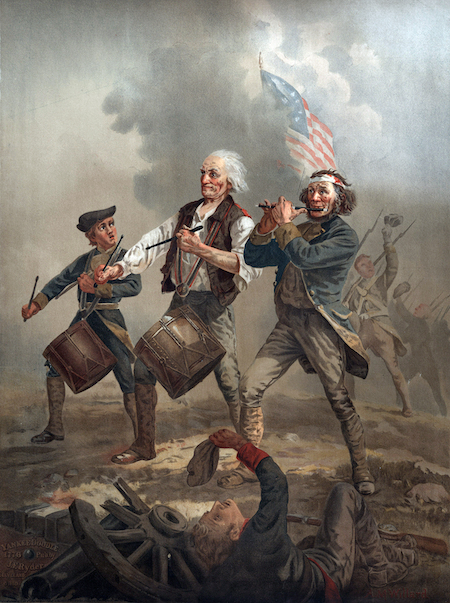Bruce Lear: Pretend patriots are afraid to let students understand all of American history so they can make informed judgments.
When a girl or boy joins the Scouts, they pledge to be a part of a troop and a part of the community of scouting. When a college student joins a sorority or fraternity, they make a positive pledge to be a part of something. We pledge allegiance to the flag as a community of Americans.
But not all pledges are positive. Some drive a wedge between us. The 1776 Pledge isn’t about building a community. It’s more like a tool to mold public schools into a political prop instead of a place of learning.
According to the 1776 Action website, when candidates and elected officials sign this pledge, they are helping to stop the “anti-American Indoctrination of Our Children and Grandchildren.” It’s another not so veiled attempt to use public schools as a wedge issue, a solution in search of a problem that doesn’t exist.
The 1776 Commission was born in the final months of the Trump administration to promote “Patriotic education,” a direct response to the 1619 Project, which put teaching about slavery as a centerpiece of American history. The 1776 Commission report was criticized by many historians as being factually inaccurate, while the right attacked 1619 Project for supposedly indoctrinating students.
The 1776 Pledge got some traction in Iowa when Governor Kim Reynolds boasted she was the first governor to sign it. Then three conservative candidates won seats on the Johnston school board after campaigning on the pledge, with support from 1776 Action.
At first read, it seems harmless. But the authors and those who sign are more interested in the comfort of white students than they are in teaching, or students learning to think about America historically.
The pledge is an attempt to wipe out any classroom discussion of institutional racism in the past or present. It’s really about dumbing down curriculum, a literal whitewashing of history and current events to advance a conservative political narrative.
Although the 1776 pledge employs some pretty, patriotic language, it asks politicians to pass laws that cheat kids of the truth, hoping to trick them into blindly loving America. But cheating isn’t necessary. If we honestly teach history—with the ugly parts included—and openly discuss where we are as a nation. An honest, critical look is what will promote love of country and patriotism.
It always amazes me that pretend patriots are afraid to let students understand all of American history so they can make informed judgments.
For that reason, I offer my own 2021-2022 Pledge for Public Schools:
As a Candidate and Current Office Holder, I believe:
- Public Schools are a vital building block for American democracy.
- I will do everything in my power to support through increase funding and support to enhance public schools for my community.
- Our children and grandchildren should be taught to critically think.
- American history should be honestly, and objectively taught based on facts.
- Children should be allowed to develop their understanding of our country based on historic and contemporary facts.
- When appropriate, current and past race relations should be honestly, and opening discussed in the classroom.
- A wide variety of books with different viewpoints should be available in the classroom and the school library.
Therefore, I pledge to the voters of __________________ that I will take the following concrete steps to do the following for k-12 public schools:
- Take specific steps to allow teachers the freedom to teach critical thinking.
- Take specific steps to assure that all educators are treated with dignity and respect by parents, constituents and students and give school boards and administrators local control to assure these steps are taken.
- Take steps to pay all educators more in salary and benefits to attract and retain the best educators and provide funding so school boards and administrators can assure this will happen.
Signed:
Trying to sanitize American history and American literature is cheating our children of truth. It is far better to have open and honest discussion and let students decide for themselves.
That’s the foundation public schools provide. It’s no coincidence that founders of towns first established a church and then decided a community needed a public school. We must protect public schools from those who would undermine curriculums to gain political advantage.
Top image of The American Revolution, Yankee Doodle 1776, three patriots, two playing drums and one playing a fife leading troops into battle, by Archibald M. Willard, ca 1876, courtesy of the Everett Collection and available via Shutterstock.



1 Comment
Again, Bruce…Hammer hits nail on head!
The one thing the right does well is create wedge issues to keep the lambs bleating. I just finished reading Joseph Kelly’s “Marooned: Jamestown, Shipwreck, and a New History of America’s Origin.” He points out the stark differences between the founders as autocratic Pilgrims at Plymouth.and the rag-tag survivors who established the first permanent English settlement in Jamestown. He points out that the first legislative assembly convened in Jamestown in 1619 to democratically manage the affairs of the emerging colony where the labor intensive tobacco was becoming profitable. Hence the need.for indentured servants and eventually slaves. There are varying accounts of how the 20-some Africans purchased in 1619 were integrated. Into the workforce, but the moment the Portuguese kidnapped the Africans, they lost their liberty for rest of life. Kelly comes down solidly that Jamestown is the American origin story, as does James Horn in his book “1619: Jamestown and the Forging of American Democracy.” Both books came out before the NYT Magazine project. Each lend credibility to the importance of Jamestown and, along with tobacco, the centrality of slavery and a foundational doctrine of the colonies and eventually the USA. To start America’s story at the signing of the Declaration of Independence is both lazy and inaccurate.
iowagerry Fri 3 Dec 7:33 AM